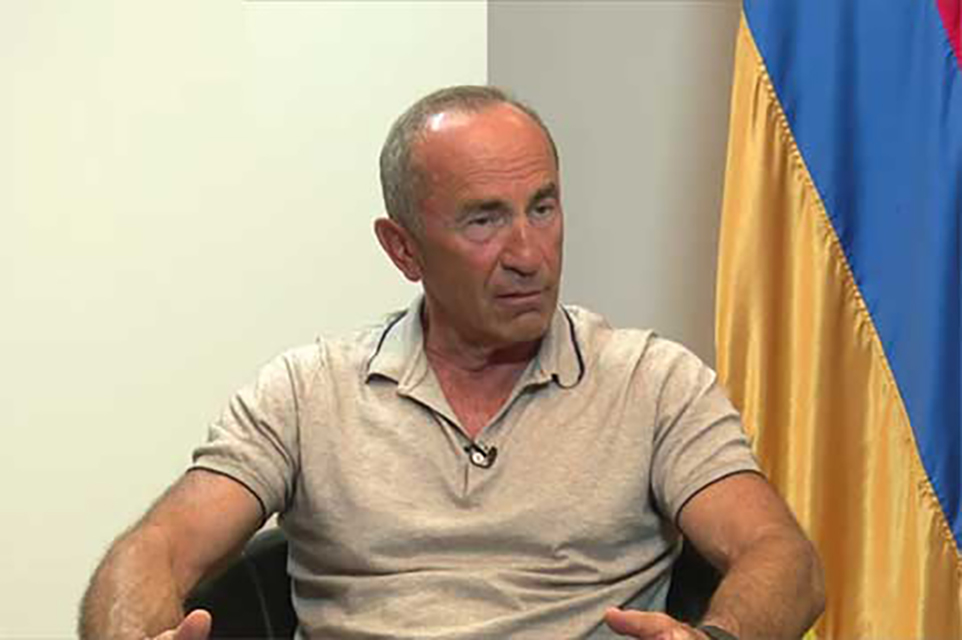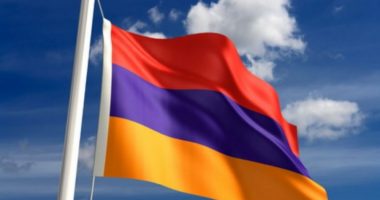By David Boyajian
Approximately one hundred Turks, a half dozen Armenian Americans, and a dozen members of the Armenian Youth Federation’s (AYF) Greater Boston Chapter attended the opening of a Turkish language book collection at Cary Memorial Public Library in Lexington, Mass. on the evening of December 10, 2018.
Ceylan Özen Erişen, Turkey’s Consul General in Boston, was the main speaker.
A Lexington police officer, an apparently Federal “special agent”, and presumably Turkish security guards attended in plainclothes.
The AYF distributed flyers outside about the Armenian Genocide of 1915–23. The flyer, which juxtaposed a “1915” Turkish fez and moustache with a “1939” Hitler hairstyle and moustache, stated, “By Condemning the Previous, We Could have Prevented the Following.”
Over one hundred books in the Turkish language were “donated” by a local “Turkish Library Group” to the library’s growing “World Language Collections.” Other languages include Bengali, French, Hindi, Italian, Korean, and Tamil. There is no Armenian section.
Interestingly, the library’s “Collections” policy states that it “will not accept donations of titles in [foreign] languages” but may make “exceptions.”
Books, stated Consul Erişen, were for “our souls, intellects, and hearts.” Turks and the library, she said, would organize events as well as Turkish story hours for children.
Erişen wants the Turks to be a “positive, contributing part of the society that they are living in … we will make the world a better place.” She didn’t indicate whether “we” includes the repressive, aggressive, jihadist-supporting, genocide-denying Turkish government and its bombastic, perpetually enraged leader, President Erdoðan.
Earlier that day, documentary filmmaker and Lexington resident Roger Hagopian visited Library Director Koren Stembridge. He expressed dismay that the Turkish Consul’s widely advertised presence marked the event as blatantly political. Hagopian also wondered if some of the donated books might fraudulently diminish the factuality of the Armenian Genocide.
Turkish books
After cutting the Turkish collection’s ribbon, Consul Eriºen reportedly remarked, “Protect me from the negative energy.” When Armenians press legitimate demands, you see, they supposedly give off ‘bad vibes.’
Among the books were the non-fiction Sapiens by Yuval Noah Harari and novels by Edgar Allan Poe, “Da Vinci Code” author Dan Brown, and Turkish authors Orhan Pamuk and Elif Şafak, both sympathetic to Armenians.
Mustafa Kemal Atatürk appears on several books by Orhan Çekiç about the battles and politics of Turkey’s genocidal, misnamed “War of Independence” (1919–23).
Bilinmeyen Lozan (Unknown Lausanne [Treaty]) by Taha Akyol deals with the Treaty of Lausanne (1923) between Turkey and its World War I European opponents. The treaty betrayed Armenians by casting aside the Treaty of Sevres (1920) which had aimed to restore ‘eastern Turkey’ to Armenia.
No answer, just bullying
Since there was no question and answer period, I approached Consul Erişen after the event. The “special agent” stood 10 feet away.
Turkey is the world’s biggest jailer of journalists. So I asked Erişen to compare her government’s suppression of freedom of the press and speech with American libraries’ support for these freedoms. She just stared at me.
A man, presumably Turkish, immediately thrust himself between us and attempted to bully me. Walking away, I recalled the violent attacks Turkish President Erdoğan’s hoodlum entourages have made upon journalists and protesters in the U.S. and elsewhere.
The AYF did manage to hand Erişen a letter that included demands for Turkey to acknowledge the Armenian Genocide and return occupied Armenian lands. The Turkish consulate in Boston had for years refused to accept the letter during AYF demonstrations.
Director Stembridge
Two Armenian Americans and I spoke to Library Director Stembridge immediately after the event.
We explained that Consul Erişen represents an autocratic government that imprisons journalists and political dissidents, violates the human rights of Kurds, Alevis, Christians, and others, and denies the Armenian Genocide. Should a library be spotlighting such a person?
Ms. Stembridge replied that because the Turks themselves invited the consul the library could do little about it.
Stembridge also understood our uneasiness about the possible presence of factually dubious books about the Armenian Genocide.
We noted that a new genocide could occur. For 25 years Turkey has closed its border with Armenia, threatened another “1915,” and in 1993 had planned to attack Armenia during a coup attempt in Russia. Ms. Stembridge is of ethnic Russian ancestry.
She took our concerns seriously and was gracious and sympathetic.
Blatantly political
I believe that Consul Erişen’s conspicuous presence and the donation of Turkish books were essentially political, intended to boost Turkey’s image in this prominent, historic, upper-middle class town 10 miles northwest of Boston.
The first battles of the American Revolution between colonists and British troops were fought in Lexington and nearby Concord in 1775.
Settled around 1642, Lexington’s colonial populace was primarily of Anglo-Saxon ancestry. But over the last decades substantial numbers of Jews and Asians, along with many Armenians, have moved there.
In 2007, Armenian residents and human rights advocates forced Lexington to eject the Anti-Defamation League’s programs due to its collusion with Turkey and Israel to diminish the factuality of the Armenian Genocide and defeat Congressional resolutions on that genocide. About a dozen other municipalities and the Massachusetts Municipal Association did the same in what quickly became an international embarrassment for Jews, Israel, and Turkey.
Eriºen noted in her speech that similar Turkish book collections have been established in Santa Clara, CA and Houston, TX.
It seems clear that the Turkish Foreign Ministry has had a hand in all this.
Such activities are yet another sign that the Turkish government, in addition to spending millions on lobbying in America, is working to increase the political influence of Turks in this country.
David Boyajian is a freelance journalist. Much of his work is archived at http://www.armeniapedia.org/wiki/David_Boyajian.










